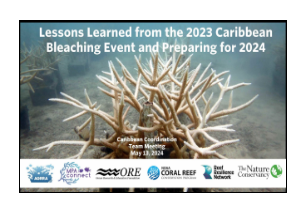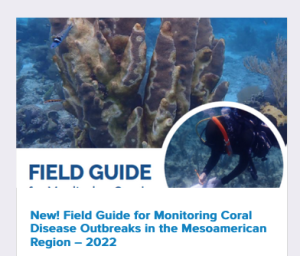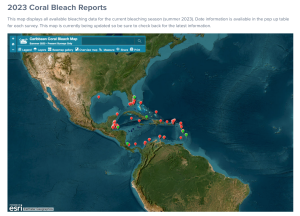The Atlantic and Gulf Rapid Reef Assessment (AGRRA) website at www.agrra.org offers a large suite of educational materials and regional databases/interactive maps related to coral reefs in the Caribbean. A few of the resources are highlighted below.
Cited as New Webinars at aggra.org/RESOURCES/webinars:
–  Lessons Learned from the 2023 Caribbean Bleaching Event and Preparing for 2024 – CCT May 13, 2024
Lessons Learned from the 2023 Caribbean Bleaching Event and Preparing for 2024 – CCT May 13, 2024
On YouTube | Presentation Slide Deck (PDF)
“As NOAA announces the fourth global bleaching event, restoration practitioners, scientists and reef managers across the Caribbean and Florida are assessing the actions they took to respond to the 2023 thermal event and planning for the possibility of similar conditions in 2024. On May 13th from Noon-1:30 pm EST, practitioners across the region discussed actions that were implemented, and the lessons learned that could help inform future responses…”
– New Caribbean Coral Restoration Efforts – April 8, 2024 – “Caribbean Cooperation Team Partners Meeting: New Caribbean Restoration Efforts & introduction to AGRRA/MPAConnect’s Restoration Roadmaps Project.”
On YouTube
– Unomia Learning Exchange – February 23, 2024: “A learning session and briefing alert on the potentially invasive soft coral, Unomia stolonifera, in the Caribbean.”
On YouTube
– Acropora 2023: Heat-related Mortality– November 13, 2023 – “Caribbean Cooperation Team Partners Meeting: Acropora 2023: Resistance or Rescue What’s happening? What can we learn? What’s next?”
On YouTube
Also under Coral Disease Resources/New Resources:
 – FIELD GUIDE for Monitoring Coral Disease Outbreaks in the Mesoamerican Region 2022. PDF (Released Feb 27, 2023)
– FIELD GUIDE for Monitoring Coral Disease Outbreaks in the Mesoamerican Region 2022. PDF (Released Feb 27, 2023)
“A complementary tool for managers, specialists, students, policy makers and a general audience who are interested in learning more about monitoring and responding to coral disease outbreaks in the Mesoamerican Region.”
– Stony Coral Tissue Loss Disease – A Present and Growing Threat to Coral Reefs Released 2022. PDF
“Funded by NOAA’s Regional Collaboration Network and the Southeast and Caribbean Regional Team (SECART)”
– Observations of rapidly progressing lesions on corals within the Florida Keys National Marine Sanctuary: a Quicklook report Karen Neely. March 2023. PDF “Disease signs primarily observed in Orbicella faveolata and Pseudodiploria clivosa that may represent variations of white plague or SCTLD or perhaps a new disease, that exhibits seasonality and, when active, shows little or no response to standard amoxicillin treatment.”
ABOUT AGRRA: “The Atlantic and Gulf Rapid Reef Assessment (AGRRA) Program champions coral reef conservation and empowers those who protect these diverse ecosystems. We are an international collaboration of scientists, managers, and supporters aimed at improving the regional condition of reefs in the Western Atlantic and Gulf of Mexico. For 20 years, AGRRA has used an innovative regional approach to examine the condition of reef-building corals, algae and fishes and support the conservation of coral reef ecosystems. We curate and distribute data, research and educational materials that support this mission.”
Read more on AGRRA’S About Us page.
Of particular note is AGRRA’s Data Explorer, a tool that researchers and citizen scientists over the whole of the Caribbean can use to report and share observations on Benthic Organisms, Fish, Corals and SCTLD, or that can be accessed just out of interest to see what’s going on in the Caribbean at large.

There is a separate page on Coral Bleaching which includes protocols for reporting observations and interactive maps showing 2023 Coral Bleach Reports and All Coral bleach data combined (2017-2023)
Thx AGRRA!
